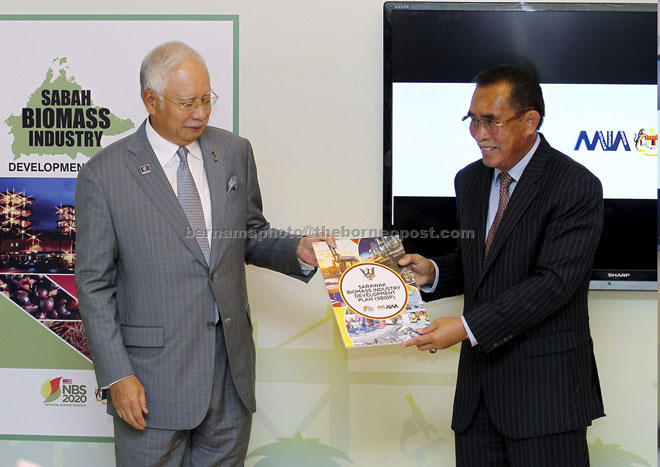
Najib (left) receiving the Sabah and Sarawak Biomass Industry Development Plan from Len Talif in Putrajaya yesterday. — Bernama photo
PUTRAJAYA: Prime Minister Datuk Seri Najib Tun Razak yesterday launched the Sabah and Sarawak Biomass Industry Development Plan, which he described as a major milestone in Malaysia’s bid to become South East Asia’s premier biomass processing hub.
“In order to be a contender as the premier biomass processing hub in South East Asia, Sabah and Sarawak would have to play an instrumental role,” he said, pointing out that combined, the two states account for more than 50 per cent of biomass resources in Malaysia.
“If we could convert these biomass resources to higher value products such as biofuels and biochemicals, it can create a pathway for further downstream processing into products such as bioplastics,” he said at the launch of the plan here.
Also present were International Trade and Industry Minister Datuk Seri Mustapa Mohamed, Minister in the Prime Minister’s Department Datuk Mah Siew Keong, Sabah Deputy Chief Minister Datuk Raymond Tan Shu Kiah representing Chief Minister Datuk Seri Musa Aman, and Assistant Minister in the Sarawak Chief Minister’s Office Datuk Len Talif Salleh representing Chief Minister Datuk Patinggi Tan Sri Adenan Satem.
Najib, who is also Finance Minister, said the state-level biomass development plans are the fruits of close collaboration between the federal and state governments in formulating specific biomass opportunities that are unique to individual states.
“Both state governments are adopting a progressive vision and taking concrete measures to maximise their biomass potential, so that industry can co-develop a competitive regional biomass value chain and eco-system,” he said.
Najib said the Sabah and Sarawak state governments and Agensi Inovasi Malaysia (AIM) would establish a local task force to implement their respective biomass action plan.
Under the plan, he said, Sabah could create RM3.2 billion in additional Gross National Income (GNI), RM13.5 billion in new investment opportunities and 25,000 new jobs leveraging on the 4.8 million dry tonnes of its biomass feedstock from the oil palm sector.
Biomass development in Sabah would focus on three main clusters namely Lahad Datu, Sandakan and Tawau, he said.
For Sarawak, he said, the biomass industry developmentcould generate an additional RM4.8 billion in GNI, create 30,000 new jobs and RM18 billion in investment opportunities for the state throughout the value chain, utilising around six million dry tonnes of its biomass resources.
The key biomass clusters in Sarawak would be Bintulu, Miri, Tanjung Manis and Kuching, he said.
Najib said the development of the biomass industry could help the country reduce the reliance on fossil fuels and increase its ability to weather global economic uncertainties while contributing positively towards Malaysia’s march to become a high-income nation by 2020.
He said Malaysia’s biomass sector had added nearly 7,000 jobs through new ventures since 2010.
“The sector can add a significant number of new high value jobs when some of the biofuel and biochemical projects start commercial-scale production in the next three years,” he said.
Since 2011, Najib said, Malaysia has made notable leaps in attractiveness as one of the region’s preferred biomass investment locations.
He cited a recent independent benchmarking study conducted on global biomass economies, which ranked Malaysia number one in the South East Asia region due to vast improvements in infrastructure and strong holistic government support for the biomass industry from 2010 to 2015. In 2014, a total of 12 biomass projects amounting to RM82.9 billion were approved compared with 11 projects worth RM54.6 million in 2013, he said.
“While most approved projects to date have been bioenergy-related, the increase in the on-going development of higher value added biomass projects such as biofuels and biochemicals are testaments that Malaysia is moving in the right direction,” he said.
Meanwhile Adenan, in his speech read by Len Talif, said Sarawak would integrate biomass as a new promoted industry under the Sarawak Corridor of Renewable Energy (SCORE) guided by a detailed roadmap and an action plan.
“Sarawak can host 10 biofuel or biochemical plants in various stages of development, mobilising six out of the 19 million dry tonnes of biomass in Bintulu, Miri, Tanjung Manis and Kuching in the next 10 to 15 years,” he said.
Musa, in his speech read by Tan, said Sabah’s Ministry of Industrial Development would be sprearheading the realisation of the Sabah and Sarawak Biomass Industry Development Plan.
“For the firt time, we can say with certainty that some serious biomass investments are coming into Sabah, and one or two of them should start some time this year,” he said. — Bernama
